Premium Only Content
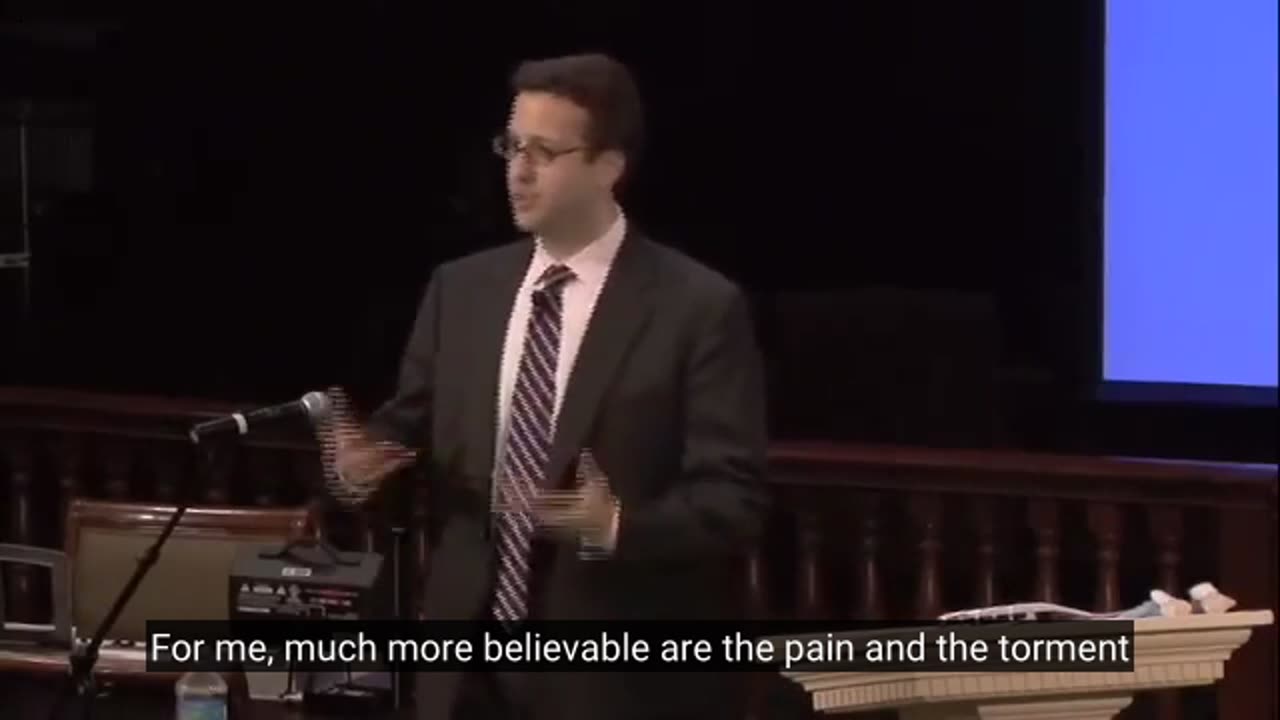
Tolstoy's Ivan Ilyich Died So That We Can Live
https://www.youtube.com/watch?v=al4bfFDnAkA
Analiza Tolstojeve umetnosti in "Smrti Ivana Iljiča"
Ta analiza se osredotoča na preobrazbo Tolstojeve umetnosti skozi desetletja in na osrednjo temo "Smrti Ivana Iljiča" – eksistencialno krizo in soočenje s smrtjo.
1. Tolstojeva umetniška preobrazba
V nasprotju z Vojno in mirom, ki je ep o življenju in njegovi veličini, Smrt Ivana Iljiča prikazuje zožen in utesnjujoč svet posameznika, ki se sooča z neizbežnim koncem.
Če je mladi Tolstoj v Vojni in miru videl življenje kot ples v veličastni plesni dvorani, starejši Tolstoj v Smrti Ivana Iljiča vidi le temačno ozko krsto. Ta sprememba ponazarja Tolstojev prehod od slavljenja življenja k njegovemu globokemu raziskovanju, še posebej v kontekstu smrti.
2. Ivan Iljič kot "duhovni zombi"
Ivana Iljiča ne muči eksistencialna radovednost, kakršno vidimo pri Pieru Bezuhovu v Vojni in miru, ki nenehno išče smisel. Ivan Iljič živi avtomatizirano življenje, zgolj izpolnjuje pričakovanja družbe:
Študira pravo, ker tako narekuje družbeni red.
Se poroči, ne zaradi ljubezni, ampak iz praktičnih razlogov.
Uveljavi se v karieri, pridobiva več denarja, kupi večjo hišo, a nikoli ne razmišlja o pravem smislu vsega tega.
Živi, kot da je že mrtev, kar avtor opisuje kot "duhovno zombifikacijo" – življenje v iluziji varnosti in rutine.
3. Padec z lestve in simbolika bolezni
Ivanova fizična bolezen se začne z navideznim nepomembnim padcem z lestve, ko ureja zavese v svoji novi hiši. Čeprav je bolečina sprva majhna, začne naraščati, dokler ne postane nevzdržna.
Ta dogodek ni naključen – Tolstoj nikjer ne pove, da je ravno padec vzrok bolezni. Bolezen ni samo fizična – je manifestacija duhovne praznine.
Ko Ivan obišče zdravnika, je dialog cinično absurden:
Zdravnik ponuja več možnih diagnoz (slepič, ledvice...), a Ivan želi vedeti le eno stvar – ali je resno ali ne.
Ko dojame, da je resno, se sooči z nepojmljivim dejstvom – da umira.
Ivan Iljič spozna, da smrt ni nekaj, kar se dogaja drugim – dogaja se njemu, in to je trenutek njegovega duhovnega prebujenja.
4. Soočenje s smrtjo: razpad iluzij
V agoniji išče uteho – različne "zaslone" (družinske odnose, vero, zdravnike, prijatelje...), ki bi ga zaščitili pred neizbežnim.
Toda Tolstoj ponavlja besedo "to" (v ruščini "это"), kar se lahko nanaša na:
Smrt kot neizogibno realnost
Smrt kot intimnega, nezgrešljivega spremljevalca
Smrt postane neizprosen partner, ki ga Ivan Iljič ne more nadzorovati, ignorirati ali utišati – za razliko od žene, zdravnikov, službe, ki jim je vse življenje lahko vsilil svojo voljo.
V tem pogledu je Tolstojeva smrt nič manj kot brutalni "odvzem moči" posamezniku, ki je vse življenje gradil iluzijo nadzora.
5. Preobrazba: od duhovne otopelosti k prebujenju
Ivan Iljič gre skozi proces podobno kot zasvojenec v abstinenčni krizi.
Najprej zanikanje – verjame, da je njegova bolezen le posledica nesrečnega padca.
Jeza in strah – obsoja svojo družino, zdravnike, sistem, ki ga je izdal.
Duhovno prebujenje – končno dojame, da ne gre več za "kaj bo naprej?", ampak za "kaj je najpomembnejše?"
Vprašanje se spremeni iz "kaj sledi?" (kot pri karieri, napredovanju) v "kaj je bilo prvo in najpomembnejše v mojem življenju?"
To je tudi Tolstojeva lastna dilema, ki jo je izrazil v Izpovedi:
"Ali obstaja kakšen smisel v mojem življenju, ki ga smrt ne more uničiti?"
Zanj je bil odgovor jasen: duhovna narava človeka in ljubezen, izražena skozi dejanja sočutja.
6. Zadnje dejanje – resnična ljubezen in poslednja milost
Pred smrtjo Ivan Iljič prvič v življenju naredi nekaj za nekoga drugega – prosi, naj njegovega sina odpeljejo stran, da mu prihranijo bolečino.
To je njegovo prvo in edino nesebično dejanje – dejanje ljubezni.
Nekateri razlagajo ta trenutek kot krščansko spreobrnjenje, vendar Tolstojeva obravnava ostaja dvoumna. Je Ivan Iljič res našel odrešitev ali zgolj iluzijo utehe?
7. Končni sklep: Tolstoj kot iskalec resnice
Najbolj fascinantno pri Smrti Ivana Iljiča ni odgovor na vprašanje smrti, temveč sam proces iskanja.
Tolstoj ne ponuja lahkih rešitev.
Ni prepričan, da je Ivan Iljič res našel smisel.
Toda Tolstoj še vedno išče.
Zato se njegova umetnost od Vojne in miru do Smrti Ivana Iljiča premika od slavljenja življenja k neusmiljeni preiskavi njegove minljivosti.
In čeprav Ivan Iljič na koncu morda ne najde popolnega odgovora, Tolstojeva mojstrska pripoved poskrbi, da se z istim vprašanjem sooči vsak bralec:
🔹 Kaj je v mojem življenju res pomembno, če vem, da bom umrl?
But something happens with Tolstoy's art. Something happens with Tolstoy's characters over the next 30 years. Because Tolstoy will write The Death of Ivan Ilyich about 30 years later. And if War and Peace is this giant celebration of everything that is in the world, then The Death of Ivan Ilyich is more like a taut string ready to snap. Or as one critic put it, the young Tolstoy saw all of life like a giant glittering ballroom, and the late Tolstoy saw only Ivan's narrow black bag. And there's something to that. See, because Ivan doesn't ask any of the questions that Pierre was asking. He's not searching for any kind of truth. Tolstoy writes, Ivan Ilyich's life was most simple and ordinary, and therefore most terrible. It's not that Tolstoy had anything against ordinariness. Actually, that moment when Pierre eats the potato is quite ordinary. But it's also extraordinary. Ivan never reaches that level. He's a kind of spiritual zombie. He's on autopilot. He does what he's supposed to do. He goes to law school like his father, and he gets a job. And he rises the ranks, and he makes a little bit more money, and he gets a house, and then he picks up a wife along the way. Not exactly because he loved her, not exactly because she was a good social fit, but some combination of those two considerations. And of course, he gets a bigger house, and he's hanging his curtains in his house, or showing the upholsterer how to hang the curtains. And he has a little fall, and he laughs it off. Ha, ha, ha, good thing I'm an athletic man, he says. And then a short time after that, he starts to get this pain in his side. And the pain gets a little worse, and he goes to the doctor. And the doctor does this brilliant analysis. Well, on the one hand, it might be this. On the other hand, it might be that. On the third hand, it might be this. But all Ivan wants to know is, is it serious or not, Doc? And of course, it is serious. He's dying, and he can't grasp that concept. What is wrong with Ivan, by the way? What is his illness? Sarah Barron and I had this conversation over dinner last week. We also talked about tennis and other things, too, so don't worry, it wasn't that depressing of a dinner. But most readers assume what Ivan assumes, that the cause of his death was the fall that he had from the ladder. But you see, Tolstoy never tells us that. Tolstoy doesn't make it that easy on you. He forces us, as readers, to grapple alongside of Ivan with the strangeness of this event that he is confronting. It's an event beyond all explanations, all labels, all causality. Ivan tries in vain to put a label on this experience, which he just can't conceptualize until this moment. Suddenly, the matter presented itself in quite a different aspect. Veriform appendix, kidney, he said to himself. It's not a question of my appendix or my kidney, but of life and death. Yes, life was there, and now it's going, and I can't stop it. There was light, and now there's darkness. I was here, and now I'm going there. Where? A chill came over him, his breathing ceased, and he felt only the throbbing of his heart. Where are we going? Where did we come from? These are unanswerable questions that haunted Tolstoy, and now Ivan's got to confront them himself. We can take our medicine. We can listen to the doctors' diagnoses. We can read the philosophers and the theologians. We can watch Dr. Sanjay Gupta on TV, who I think is our Surgeon General now. But in the end, we have to, each one of us has to confront these big questions on our own. We have to confront that it on our own. To save himself from this condition, Ivan looked for consolations, new screens. And they were found, and for a while seemed to save him, but then they immediately fell to pieces, or rather became transparent, as if it penetrated them, and nothing could veil it. And Tolstoy keeps repeating this word, it. In Russian, it is an interesting word. It also means she. And Tolstoy knew he was playing with this double meaning, because what Ivan is confronted with now is both the most impersonal, universal experience, and also the most intimate relationship of his life. And death is a demanding, irascible partner. And this is one relationship partner he can't manage. It incessantly nags and gnaws at him, kind of like his wife. But unlike his wife, it won't stay at home when he goes out to play bridge. It's not impressed with his job title or his pretty curtains. So Ivan becomes like a drug addict going through withdrawal. As the comfortable numbness of his existence starts to fall away, he is left with the pain not only of his physically decaying flesh, but of a slowly awakening consciousness. He's coming face to face with a new question that he never even knew existed. Not what's next. How do I get from A to B? How do I get a better house, or a promotion, or a better job? Not what's next, but what's first? What's most important in my life? Given that I'm going to die, how should I spend my time on this earth? That's not an abstract question to Tolstoy. That was the most fundamental, practical question that every human being can ask. Tolstoy asked it this way in his confession. Is there any meaning to my life that will not be destroyed by my death? And Tolstoy believed if there is any meaning in our lives, that will not be destroyed by our death, it has to lie in that aspect of our being that is indestructible. And for Tolstoy, that was our spiritual being. And the greatest manifestation of our spiritual being on earth, he believed, was through acts of love and compassion. And this is precisely what Ivan does at the end. When he pities his son, he has asked to have his son sent away. This is perhaps the first truly selfless act of Ivan's life. He goes through, most scholars agree that he goes through some kind of a spiritual conversion, a Christian conversion. But I will tell you, I think that's the least persuasive part of the novella. For me, much more believable are the pain and the torment that Tolstoy describes. These are developed excruciatingly well by the master artist. I'm not convinced that Tolstoy was convinced that Ivan actually found his answer. But what I am convinced of after reading this novella is that Tolstoy was still searching like hell for it. But what I am convinced of after reading this novella
-
 1:12:05
1:12:05
vivafrei
3 hours agoLegacy Media is the Enemy of the People! Israel Stikes Qatar, U.S., Gets Mad! AOC So Stupid & MORE!
12.1K34 -
 52:13
52:13
The Quartering
2 hours agoRace War Nears, Russia Makes Huge Mistake, Fauci Bombshell & More
64.5K64 -
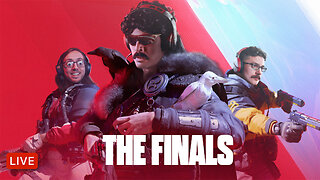 LIVE
LIVE
Dr Disrespect
5 hours ago🔴LIVE - DR DISRESPECT - THE FINALS - NEW SEASON 8 LAUNCH EVENT W/ THE SHOTTY BOYS
1,401 watching -
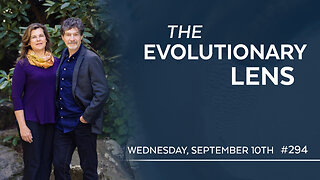
Darkhorse Podcast
3 hours agoThe 294th Evolutionary Lens with Bret Weinstein and Heather Heying
6.03K7 -
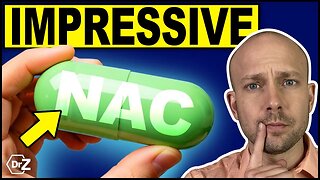 11:49
11:49
Dr. Nick Zyrowski
9 days ago12 Unusual NAC ( N-Acetyl Cysteine) Questions Nobody Ever Answers
11.8K9 -
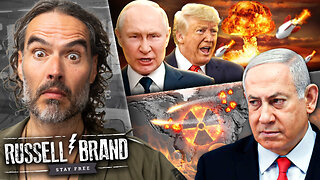 1:03:45
1:03:45
Russell Brand
4 hours agoWW3 IMMINENT! Israel & Russia Strikes Leave World “ON THE BRINK” - SF631
109K57 -
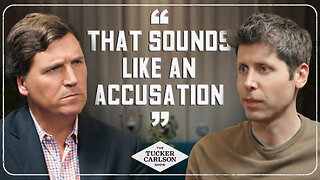 56:18
56:18
Tucker Carlson
3 hours agoSam Altman on God, Elon Musk and the Mysterious Death of His Former Employee
32.7K89 -
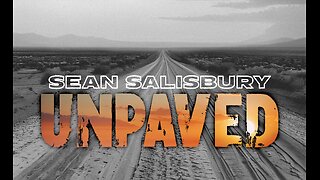 1:12:40
1:12:40
Sean Unpaved
4 hours agoJalen Carter's 1-Game Suspension & The Pressure for Instant Greatness in Sports
32.6K5 -
 1:07:27
1:07:27
LindellTV
2 hours agoBREAKING: MICHIGAN JUDGE THROWS OUT CRIMINAL CHARGES
21K12 -
 11:34
11:34
The Kevin Trudeau Show Limitless
6 hours agoClassified File 4 | The Hidden Science of Brain Control REVEALED!
10.2K4